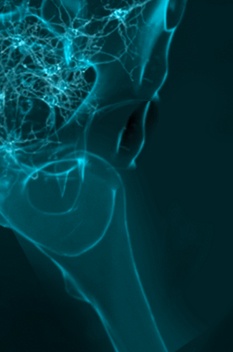Introduction
Peripheral nerve tumors can occur anywhere in the body. Most of them aren't cancerous ...
Burning Pain in the Most Sensitive Region of the Body
Pudendal neuralgia is characterized by chronic pain that is perceived as burning and extends from the clitoris to the perineum and anal region in the pubic area. The pain is mainly caused by a compression of the pudendal nerve in the Pudendus or Alcock canal. Frequently seen in women after childbirth injury, the pain continues for 20 to 30 years after vaginal birth. Risk factors are the suction cup or forceps births as well as the birth of large babies. Men can also be affected by pudendal neuralgia. The pain extends from the penis and testicles to the anal region.
With a pudendal neuralgia, also known as "Alkock's Canal Syndrome", the pain typically occurs instantly when sitting down, while no discomfort is felt in a lying or standing position. Pain in the perineum is on one or both sides and can radiate to varying degrees forwards or backwards. In addition to the pain, other symptoms often occur, such as hesitant emptying of the bladder, frequent urination or irritable bladder, constipation, painful bowel movements or sexual dysfunctions with loss of libido. Pudendal neuralgia is a chronic disease, the pain responds either poorly or not at all to the usual painkillers (analgesics).
Nerve blockade of the pudendal nerve - without CT or MRI
Transvaginal or transrectal palpation and temporary blockade of the nerve are the essential keys to diagnosis. Patients experience a marked sensation of pain when the nerve is palpated. In addition, the Tinel sign is typically positive: a tingling, needle-like experience is perceived along the nerve. Selective nerve blockade of the pudendal nerve can take place during the consultation, without CT or MRT. This nerve block is decisive for the diagnosis and for the choice of the subsequent treatment methods for pain in the pubic region. A positive response to the blockade of the nerve, i.e. the short-term absence of pain, is an important diagnostic indication.
If a Pudendal neuralgia is associated with radiating pain to the buttocks, deep back or legs, it is not an Alkock's canal syndrome, but a so-called sacral radiculopathy.
Surgical decompression and electrical stimulation of the pudendal nerve
Since Pudendal neuralgia is based on a kind of contusion to the pudendal nerve or increased pressure, surgical nerve decompression, i.e. relieving the pressure on the pudendal nerve, is the most effective treatment method for this diagnosis. The procedure is performed using a laparoscopic decompression procedure: tiny cameras are used to visualize the fine, sensitive nerve structures and allow minimally invasive, careful surgery. The majority of patients are pain-free after a few months.
If the pudendal nerve is not only squeezed but also injured, for example after surgical intervention, pudendal neuromodulation is the therapy of choice. In this so-called LION procedure (Laparoscopic Implantation of Neuroprothesis), a microstimulator system a few millimetres in size, is placed on the pudendal nerve by laparoscopy in a minimally invasive procedure. The electrical stimulation is controlled by the patient using a remote control and leads to relaxation of the nerve.
To help people in difficult situations to improve their quality of life has become his life's passion. Continuous research, decades of clinical experience and the focused determination to find a solution for previously unsolved medical problems, have enabled Prof. Possover to help often quite discouraged patients find release from their seemingly insurmountable problems.
Our team will take care of you
We will dedicate our expertise and know-how to help you find the solution that is right for you.
„As a cheerful, open and communicative person, I really appreciate coming into contact with people from all over the world. The well-being of others is very important to me.“
If it is your preference, your attending doctor is welcome to accompany you to Zürich. You will then have a person at your side who is familiar with your medical concerns. At the same time, your doctor will have the opportunity to be present during the planned operation and gain unique insights into the applied practice of Neuropelveology.

Neuropelveology is a medical discipline developed by Prof. Possover. It is based on the discovery of the pelvic nerves and includes the diagnosis of the diseases of these nerves by means of gynaecological examination methods and their treatment by means of laparoscopy.
Read morePeripheral nerve tumors can occur anywhere in the body. Most of them aren't cancerous ...
Vulvodynia is a chronic pain syndrome affecting respectively the vulva and occurs ...
Klausstrasse 4
CH - 8008 Zürich
Switzerland
E-Mail: mail@possover.com
Tel.: +41 44 520 36 00